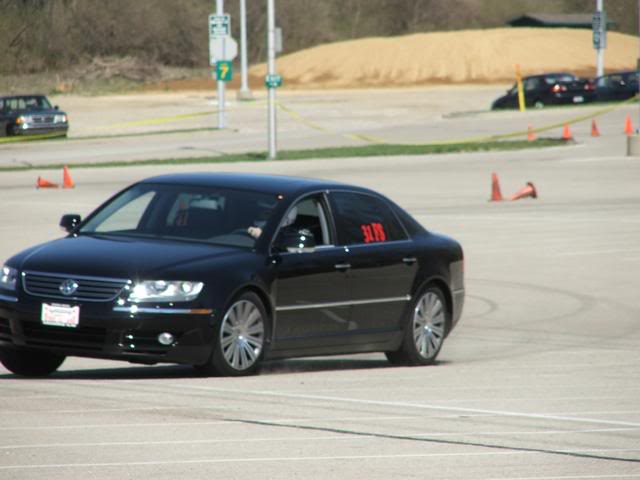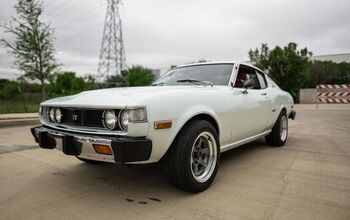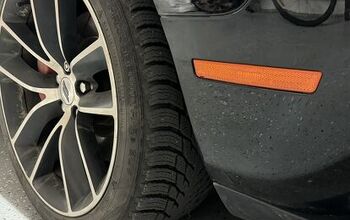Autocross: Is It Really Entry-Level Motorsport?

Are those people wasting their time, or do they provide the necessary base for the racing pyramid? This question was asked by a reader in my recent piece about racing an ARCA Tempo, and I think it’s worth discussing for a moment despite the fact that autocross-related articles have consumed enough electrons on the ‘Net to cause jealousy among the folks who operate the Large Hadron Collider.
I will start off by freely admitting that autocross is an area where I do not particularly excel as a driver. In the right car, on the right track, I’m nearly as fast as anyone in the business and I have the track records and wins to prove it. In my single season of National-level SCCA autocross, however, I finished slightly above midpack in three Tour events and almost exactly midpack in the Solo Nationals PAX Index. My modest gift as a driver is a willingness to accept a little bit of danger, which means I frequently find a little more velocity in high-speed corners around racetracks. In autocross, that’s a useless skill. My weakness as a driver is temper, which makes me a solid passer but absolutely abysmal third-run autocrosser.
Since I’m the closest thing TTAC (or nearly anybody else in the autoblogging world) has to a National-level cone-chaser, however, I’ll talk a bit about what autocross is and what it is not.
You can autocross anything.
No, really. You can autocross anything.
See, I’m serious. In reality, the only vehicles the SCCA will keep off a course are raised-suspension trucks. A 2WD Chevy S-10 is just fine; a Toyota Land Cruiser isn’t. Most people have access to something they could autocross. If not, you can rent a car. A weekend of autocross will not break a new Cobalt or Elantra.
This is what autocross will do for you: You will get a sense of what happens when you exceed the limits of your tires at street-legal speeds. Don’t expect to go above 70mph at an SCCA-sanctioned autocross. 60mph is more likely, 50mph is probably the max for most sub-250hp cars. You will learn to correct your car when it goes “out of control”. You will understand, finally, just how hard you can press the brakes. It’s harder than you think, and proper braking is what separates autochamps from autochumps, so get used to it.
You will come to know the basics of a race weekend: pre-race preparation, packing the car, showing up, registering, standing out in the heat and the rain. You will learn more than you ever wanted to know about tire compounds, ABS activation, the thresholds and secret activation conditions of factory ESP programs, and gear ratios. You will acquire the ability to absolutely monster most 25mph offramps.
You will make friends who are serious about cars. You will enjoy yourself, unless you are a psychotic sociopath like me, and then you will kick fenders off your car, throw your helmet, make enemies, throw up from angst, and spend long, depressed weeks regretting a struck cone. You will learn what kind of car you’d really like to own and drive.
If you go to the National level, you will learn how to load a car on a trailer and drive a tow vehicle. You will learn what alignment really does for cars. You will learn about shock valving, suspension geometry, and weight transfer. You will learn how to memorize a course and how to perform under massive pressure. You will make a few enemies, if you’re any good. You will learn the SCCA’s mincing, infuriating interpretation of its rulebook, and you will learn how to effectively protest your competitors.
You can learn a lot autocrossing. Here’s what you won’t learn. You won’t learn how to be truly fast on a road course, no matter what anybody says. You won’t learn how to race, how to hit other cars, how to recover from being hit. You won’t experience the thrill of putting your foot on another man’s neck on the entry to a 110mph turn. You won’t be a racer. You’ll be an autocrosser, and for many people that’s enough.
Most of us can afford to start with either autocross or a course of HPDE instruction. Spending time and attention on one won’t help you with the other. Which should you choose? Budget and time are important here. Racing wheel-to-wheel will cost you a minimum of $5,000-10,000 a year and several weekends, plus prep time. If your budget doesn’t go that far, consider autocross. Understand, however, that National-level autocross costs thousands of dollars per year, even in Stock.
If you have the budget and time for either, just ask yourself: Would I rather be a BASE jumper or a chess player? The answer to that will tell you in which direction you should look.

More by Jack Baruth
Latest Car Reviews
Read moreLatest Product Reviews
Read moreRecent Comments
- Cprescott No big loss. It was always third rate when there was competition. At best its only good point was its price point.
- ToolGuy Journalists saving the world again. LOL.
- Stars9texashockey The Lyriq is selling better because it's discounted now. l think Lincoln does a much better job of styling their SUV's than Cadillac (except for Navigator vs. Escalade,) but they don't sell.However, Cadillac continues to offer sedans where Lincoln doesn't.
- SCE to AUX At this point, I don't know who the target customer is for Cadillac. I have zero interest.
- Cprescott Cadihack styling is stale - the interiors have not been luxurious, and the V-Series should be the base models in order to make waves. Until this company ditches the putrid and hideous pre-dented look of Arts and Scientology (!), the company is going nowhere.




































Comments
Join the conversation
I've done both and I'm big on the HPDE but not so big on the AX. I'm at NHIS right now with ACNA-NAAC as proof of that. OK I'm not at NHIS as the track isn't open at this hour but I'm at the hotel on the wifi. I'll be back at the track in an hour. IMO the rush or excitement is different between the two. You've got your quick fix AX which is a moment of fun followed by a long dwelling of suck shagging cones for other hack drivers. Then you've got HPDE which gives the longer lasting rush about 20-30 times the duration and the speeds are MUCH greater. For me the HPDE is just right. You also get that 20-30min rush four or five times in a day for one to as many days as you can link together. In an AX event you may run for 20mins cumulative while at HPDE you will be on track for hours whittling away at details of your line lap after lap. What I'm not liking quite so much is the semi-manic flow of NHIS. My instructor characterizes this place as a super-autocross with elevation changes. I'm becoming inclined to agree. There are some road courses with more rapid fire technical turns which necessitate a higher rate of info processing and driver control inputs for the vehicle. There are other road courses with fewer driver control inputs required per lap and or more time between those inputs. NHIS brings some of that AX flavor to HPDE, a bit like a hint of wasabi on my last sashimi, you know the one adjacent to the bright green wad of nasty. I saw it coming but ate it anyways.
An E-type a vintage car? I’m afraid not. Undoubtedly classic though. PLEASE tell us the difference between vintage and classic. oh Wise One......both are pretty vague terms.